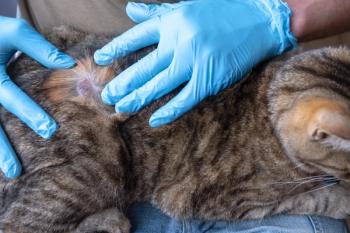
New 2012 heartworm preventive initiatives and updated guidelines available
New 2012 heartworm preventive initiatives and updated guidelines available
Barbara Griffith, DVM, along with thousands of other veterinarians, is attempting to increase the number of her patients receiving 12 doses of heartworm prevention by 12 percent in 2012, as part of Merial’s 12.12.12 campaign, announced earlier this year. The majority (64 percent) of dogs visiting veterinary clinics leave without one dose of heartworm preventive, according to Merial data. Thus the company has launched an initiative to help each veterinarian protect 144 more dogs from heartworm disease with monthly doses of heartworm preventive in 2012.
Griffith, owner of Griffith Veterinary Hospital in Whitmore Lake, Mich., has been recommending year-round heartworm prevention to her clients for years and joined the campaign to show her support. “There’s power in numbers,” Griffith says. “Once we know how many clinics took the pledge that’s more fuel for the fire. We can tell them, ‘You know, X percent of veterinarians are recommending 12-month prevention.’ Then clients don’t think you’re the only one.”
Heartworm prevention educational handouts are available to clients at Griffith’s practice and staff members have hung a poster in the exam room that compares the cost of preventing heartworm for a year versus treatment. The unseasonably warm weather hasn’t hurt, either. “Mother Nature has helped a lot by giving us mild winters,” says Griffith. “We had clients who found mosquitoes in their garage in December.”
Also, when the heartworm-treatment product Immiticide became scarce, team members posted notices in each exam room explaining that the medication wasn’t readily available—which fortified their recommendations for heartworm prevention.
“Team members would ask clients if they needed any heartworm prevention and they’d say, ‘Nope, we’re all set,’” Griffith says. “Then they’d see the sign and by the time I got in the room they’d say, ‘You know what? I don’t think we have any at home. We will take some heartworm prevention after all.'''
Griffith says she’s already seen results from her efforts. Many clients used to purchase one or two heartworm pills when she tested their pet for heartworm disease. Pet owners would promise to come back and buy more but never did. “Now Merial offers a $12 rebate for every 12 pack clients buy so it’s kind of an easy sell,” Griffith says. “We’re really flying through the medication.”
She says clients have been receptive to the program and her practice shouldn’t have a problem reaching its goal. “Merial does a great job of tracking our sales,” Griffith says. “Employees turn in coupons and receive a bonus for every 12 pack they sell.”
Griffith says it’s frustrating when her patients get heartworm disease because it’s easily preventable—and there are many conditions that aren’t. “It hurts us to see an animal get a disease that’s so easily prevented,” Griffith says. “Treatment is expensive and hard on the animal. Hopefully we’ll see a decrease in positive tests.”
Dr. Michael Murray, technical marketing director of U.S. parasiticides at Merial, says many pet owners think their veterinarian’s recommendations are optional. He explains that veterinarians can better advocate for parasite protection by knowing what the pet needs before the visit, having the products the pet needs ready at the visit, explaining the risks of parasitic infections to pet owners, and getting agreement from the pet owner about what their pet needs.
Dr. Murray says the goal of having 12 percent more dogs receiving year-round heartworm prevention can be achieved if veterinarians have 12 more conversations with pet owners every month about preventing this disease. Now more than 7,000 individual veterinarians and staff members have pledged to participate thus far. For veterinary clinics that take the 12.12.12 pledge, Merial will provide pet owner and staff educational and communication tools. (More information about the initiative is available at
Also, the American Heartworm Society has updated its guidelines this year for diagnosing, managing and preventing heartworm infection in cats and dogs, and has likewise launched a ‘Think 12’ educational initiative to help veterinary practices and pet owners implement the guidelines. To read the updated AHS guidelines and learn more about their initiative, visit
www.heartwormsociety.org
.
Newsletter
From exam room tips to practice management insights, get trusted veterinary news delivered straight to your inbox—subscribe to dvm360.





